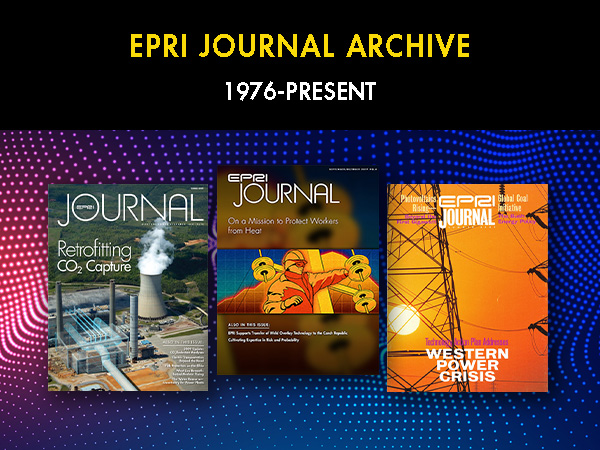EPRI Evaluates, Tests, and Publishes Guidance on Technologies for Compliance
EPRI’s effluent guidelines and water management technology programs are stepping up efforts to help the industry understand complex new federal wastewater rules and provide a technical and scientific basis for their decisions on major technology investments.
In September 2015, the U.S. Environmental Protection Agency (EPA) finalized more stringent restrictions on regulated pollutants discharged in the wastewater streams of steam electric power plants. The effluent limitation regulations apply to all existing and new steam power plants larger than 50 megawatts. Plant operators must implement new water treatment technologies to reduce and, in some cases, eliminate pollutants from wastewater streams. Compliance begins as early as 2018 and no later than 2023.
“Before the final rule, EPRI research focused on informing the rulemaking process with sound science and quality data,” said Paul Chu, manager of EPRI’s Effluent Guidelines program. “Our goal now is to get the guidance and technology in place.”
Research Priorities
The rules introduce new limits for arsenic, mercury, selenium, and nitrogen discharges from flue gas desulfurization (FGD) systems. Also known as wet scrubbers, FGD systems absorb most of a plant’s sulfur-dioxide emissions along with these trace elements, but also produce effluents that require treatment prior to discharge. EPRI has prioritized research on FGD wastewater treatment technologies because the rule could require upgrades in more than 100 plants. The rule also restricts the discharge of fly ash and bottom ash transport waters, requiring many facilities to upgrade their ash transport systems.
Through field demonstrations, EPRI is evaluating commercially available and new technologies for cost-effectiveness, reliability, impact on plant performance, and interaction with other plant systems (such as air pollution control technologies). These include FGD wastewater treatment with biological technologies—which the EPA describes as the “best available technology” for selenium and nitrogen—and physical/chemical technologies for arsenic, mercury, and solids removal.
EPRI is also investigating advanced membrane technologies and thermal evaporation treatment systems, for which the EPA established a voluntary incentive program, and is exploring solutions for treatment system by-products such as encapsulation by solids fixation and stabilization.
“We want to understand how these technologies and systems work in the context of the whole power plant and whether they can help utilities to meet the regulations safely, reliably, and cost-effectively,” said Jeffery Preece, technical leader of EPRI’s Water Management Technology program.
The Water Research Center—a field laboratory at Georgia Power’s Plant Bowen set up in collaboration with EPRI, Southern Company, and Southern Research—hosts several technology demonstrations, including a pilot-scale wastewater evaporation system, membrane technologies, and by-product encapsulation.
EPRI is evaluating real-time monitors for trace metals and nitrates to enable continuous compliance and assist in process controls. Monitoring currently relies on “grab samples” shipped to a laboratory for analysis, which takes several weeks.
Bringing Value to Industry
Tennessee Valley Authority (TVA), which provides power to businesses and local utilities in seven southeastern U.S. states, is using EPRI research to help navigate compliance at 10 coal-fired power plants affected by the new rules. EPRI is evaluating wastewater treatment technologies at a TVA plant.
“EPRI research has provided great value to TVA,” said Lindy Johnson, the utility’s senior program manager for wastewater treatment. By participating in EPRI research and sharing information with other utilities, TVA is refining its approach.
“EPRI brings an independent voice,” said Johnson. “They have been useful in evaluating vendor claims and ensuring that the technologies we install are cost-effective and reliable.”
EPRI details its assessments of wastewater treatment approaches in technology transfer sessions at member utility sites. Each session can provide engineers with credits for continuing professional development. EPRI publishes case studies and guidance to help users operate complete systems, not just individual technologies. Because testing conditions are different from conditions in many power plant applications, EPRI recommends that each site complete its own studies to support decisions on implementing technologies. EPRI plans to complete guidelines for meeting FGD wastewater requirements and for physical/chemical treatment of FGD wastewater.
EPRI Technical Experts:
Paul Chu, Richard Breckenridge, and Jeffery Preece
Further Resources:
- Flue Gas Desulfurization (FGD) Wastewater Chemical Precipitation Treatment Performance Characterization Study
- Sampling and Analysis for Steam Electric Power Plant Wastewater Monitoring
- Physical/Chemical Treatment of Flue Gas Desulfurization Wastewater–Case Study
- Evaluation of Vacom One-Step System for Concentrating Flue Gas Desulfurization Wastewater: Pilot Testing at the Water Research Center


